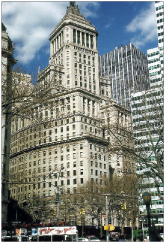
The 99-year lease at 26 Broadway led to a complicated court case decades laterNegotiating a lease for 10 or 15 years is hard enough. Just imagine dealing with one for 99 years — things get complicated.
Such was the case for Elmer Ellsworth Smathers, who, in 1920, leased the property at 26 Broadway to Standard Oil for 99 years for $225,000 a year.
Smathers died in 1928. In March 2007, the Midtown-based property investment company Chetrit Group bought the 31-story office building at the corner of Broadway and Beaver Street — as well as two out of three parcels of land under the building — for $225 million. The Smathers parcel (the third parcel) remained under the long-term lease that expires in 2019.
Beneficiaries of the Smathers estate petitioned the court for permission to sell its interest in 26 Broadway to Chetrit for $23.4 million, according to a 2008 Westchester Surrogate’s Court decision.
A handful of heirs contested the sale, and the proposal — which belied Smathers’ wishes, outlined in his 1926 will — was denied. Instead, Chetrit purchased the leasehold interest on a portion of the ground under the former Standard Oil Building last year.
“Even if Chetrit controls the property for 50 years, they don’t own the property outright,” noted Robin Abrams, executive vice president of brokerage Lansco Corp.
While there is no tally of all the 99-year leases in New York City and when they are coming up for renewal, brokers say they regularly deal with issues surrounding these century-long pacts. The terms of these long-term ground leases can dictate property deals far into the future, Abrams said, and “can unrealistically hinder one’s ability to negotiate something that is meaningful and standard by today’s real estate ideals.”
And the leases are frequently longer than 99 years.
Indeed, parcels of some of the city’s most iconic real estate properties are still operating under agreements struck when subway cars still had wicker seats. The Chrysler Building, for example, was built by Walter Chrysler on land owned by the private college Cooper Union after he acquired the 60-year ground lease on the property in 1928. Cooper Union still owns the land, and a “new” lease — signed in 1998 when Tishman Speyer acquired the building — runs through 2147. (In 2008, an Abu Dhabi sovereign wealth fund bought a 90 percent stake in the building from Tishman for a reported $800 million.)
For owners, these leases offer a way to pass down their asset. And for developers, they can be the only way to get their hands on valuable real estate when an owner won’t sell the property outright.
Ground leases are more common in Manhattan than other parts of the city because “land in Manhattan is so much more expensive,” said Richard Brown, cochair of the leasing practice group at the law firm Herrick, Feinstein.
Another recent example shows how long-term leases can come about these days.
Studley represented Cooper Union when it sold a 99-year ground lease for 51 Astor Place to developers Edward J. Minskoff Equities in 2008, for $96.97 million.
Cooper Union saw the Astor Place lease as a way develop the site into a mixed-use commercial and academic property. (The plan was to raze the structure at 51 Astor Place and replace it with a 13-story building that was scheduled to open this year, although that date has been pushed back.) The lease entitles Cooper Union to benefit from the property’s future income.
These leases usually come down to a few factors. “You want a longer period of enjoyment, to the extent that you want to finance whatever investment that you’re making,” said Woody Heller, executive managing director of the capital transactions group at Studley. Lenders are also typically reluctant to finance leaseholds for fewer than 30 years, he said. And 99-year ground leases can reap tax benefits.
Still, many of the landholders that control the long-term leasehold properties feel they were duped, “as their long-term leases may have been at highly unfavorable terms over the lease term, ultimately,” said Abrams.
Nonetheless, property owners strike 99-year lease deals today for the same reasons they did in 1920: to draw a steady income, and because they don’t have the desire or expertise to develop real estate.
As for why 99 years? Well, it may just be tradition.
“There’s no other practical reason or backstory that I know of,” Brown said.